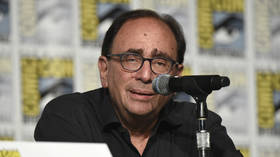Iconic children’s books censored without author’s permission


Children’s author RL Stine has said that he “never changed a word” of his ‘Goosebumps’ books, after it emerged that the series had been edited to reflect modern ‘woke’ sensibilities. News of the changes came amid controversy over the “censorship” of Roald Dahl’s children’s classics.
First published in the early 1990s, ‘Goosebumps’ is the second most popular children’s book series after Harry Potter. More than 300 million copies have been sold worldwide, with the stories a perennial favorite at school book fairs held by their publisher, Scholastic.
The series was re-released in ebook form in 2018, albeit with more than 100 edits to Stine’s original texts, the Times reported last Friday. Characters once described as “plump” are now called “cheerful,” “crazy” has been changed to “silly,” and references to “slaves” and black face paint – neither in a racial context – have been removed altogether.
A living ventriloquist dummy in 1998’s ‘Bride of the Living Dummy’ no longer renders a girl unconscious with a slap to the head, using a magic spell in the reissued version. In ‘The Curse of Camp Cold Lake’, first published in 1997, boys at a summer camp no longer give “a loud wolf-whistle” at a female camp leader, according to the Times.
The Times’ report stated that Stine himself made the changes, claiming that he engaged in “self-censoring.” Stine was heavily criticized on social media for his apparent efforts to “appease woke culture.”
“I have never changed a word in a Goosebumps book,” he tweeted on Monday, adding that “any changes were never shown to me.”
Having initially declined to comment, Scholastic told the Times this week that it made the changes to “keep the language current and avoid imagery that could negatively impact a young person’s view of themselves today, with a particular focus on mental health.”
The Roald Dahl Story Company gave a similar explanation last month when it signed off on hundreds of changes to the legendary children’s author’s works. The company said that “it’s not unusual to review the language” when republishing old series, and described the changes – which saw the words “fat” and “black,” alongside descriptions of characters as “ugly,” removed – as “small and carefully considered.”
The changes caused uproar, however, with British Prime Minister Rishi Sunak stepping in to defend the late author’s “right to free speech and expression.” Amid the controversy, Penguin Random House announced it would republish the “classic” versions alongside the censored editions.